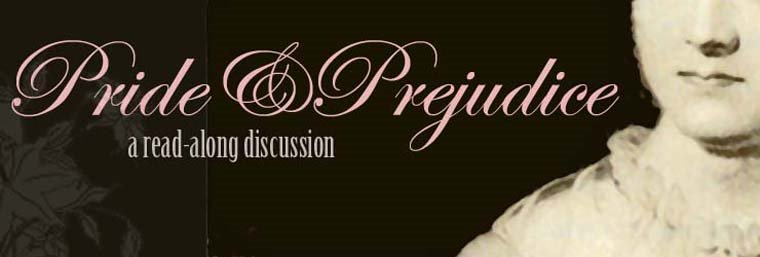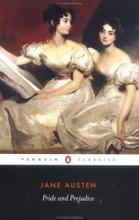My term paper took over my life this week, so P&P has (sadly) been relegated to a back burner. But I turned in my paper night before last and I'm hoping to get these answers in before Emery posts new ones. Forgive me if I write too much...I'm still in paper-writing mode. Once I added the references and double spaced it, my term paper wound up to be a whopping 50 PAGES! Grad school does sick, sick things to your brain.
Anyways, here are my responses:
I deeply admire Jane's ability to think the best of people. However, I think that Elizabeth has a point in critiquing Jane. While Jane is busy looking for the best in everyone, Elizabeth seems to be making an effort to discern the true character of others, which I think is an equally valuable quality to have. Thinking of the two sisters reminds me of Jesus's admonition to us to be "as wise as serpents and as gentle as doves." Perhaps the two sisters together fulfill this statement. Ultimately, it's difficult for me to decide which is better. Maybe the answer to this will be revealed more fully as the book goes on.
It's funny, but I've begun to answer this question just as the track "Sister don't go" comes up on my iTunes. I deeply believe that choice is a big part of love. I don't think it's about retaining the same KIND of love you have for each other in that first little while, but in continuing to find NEW ways to love each other and letting the relationship grow and mature. However, I also think that in order to experience real happiness in marriage you have to be lucky (or blessed) enough to find someone that really gets you.
I think that Charlotte does speak from a certain amount of bitterness. Mrs. Bennett describes her as being plain, and Charlotte doesn't seem to have much hope of getting married or escaping being a burden to her family. Perhaps she maintains that marriage is a matter of chance in order to feel better about not having made her own match yet. If love IS a matter of luck, then she doesn't have to acknowledge the fact that there might be something wrong with her that has kept her from finding a man of her own.
I think it's interesting that Austen tries to create a distinction between pride and vanity, as these two terms are often conflated. In our society, it seems that pride and vanity are almost synonymous. However, the kind of vanity we see a la Paris Hilton and Lindsey Lohan seems to be much more acceptable than straight pride. In terms of the book, it seems that the most proud character is Mr. Darcy thus far. If pride is the tendency of someone to think well of him or herself over others, Mr. Darcy certainly fits the bill. His interactions with everyone at the dance are a perfect example. The most vain character, in my opinion, is Miss Bingley. She seems to constantly do things to draw attention to herself (or perhaps just the attention of Mr. Darcy). Beyond thinking highly of herself, Miss Bingley strikes me as being wholly self-absorbed. It's not enough that she holds a high position in society, she also has to draw attention her status and accomplishments constantly.
Closely related to the the idea of pride and vanity is social prejudice. In Austen's book there is a definite social hierarchy. In Austen's world, money is definitely a factor. However, social prejudice extends beyond bank accounts into the realm of behavior. Mrs. Bennett is highly scrutinized by others for her improper behavior at the party, as are her younger daughters. I think that this kind of social prejudice is present in our society, but more specifically in our churches. How often have people been criticized and ostracized for not behaving in a certain manner? How many times have you felt pushed toward a certain kind of "spiritual reaction" in a worship service? Although Austen's characters are held to a different idea of propriety than we are currently, there is certainly a level of social acceptability that exists in both worlds, and the penalty for failing to fulfill either is social rejection.
My favorite character so far is Mr. Bennett. He seems to reject the idea of propriety, instead letting his daughters run wild. While this is frustrating at times, and may prove problematic later, it's also somewhat refreshing. Most of Austen's characters seem to be highly structured and follow a strict set of unspoken rules, but Mr. Bennett marches to his own drumbeat. He is sarcastic with the ridiculous Mrs. Bennett and seems to care more for his daughters' happiness than fulfilling the role society has imposed on him. My favorite quotation so far comes from him, in response to his wife's assertion that he has no respect for her nerves. He says, "You mistake me, my dear. I have a high respect for your nerves. They are my old friends. I have heard you mention them with consideration these twenty years at least.''
Friday, May 18, 2007
Subscribe to:
Post Comments (Atom)


2 comments:
Wow, Andrea! Your answers are very helpful for me and very well thought out! Thanks!
I completely agree regarding Mr. Bennet. His sarcasm and wit provide the novel with a sense of comedy, which is very entertaining to the reader. I enjoy him greatly also because he teases Mrs. Bennet, who I personally find quite annoying.
Post a Comment